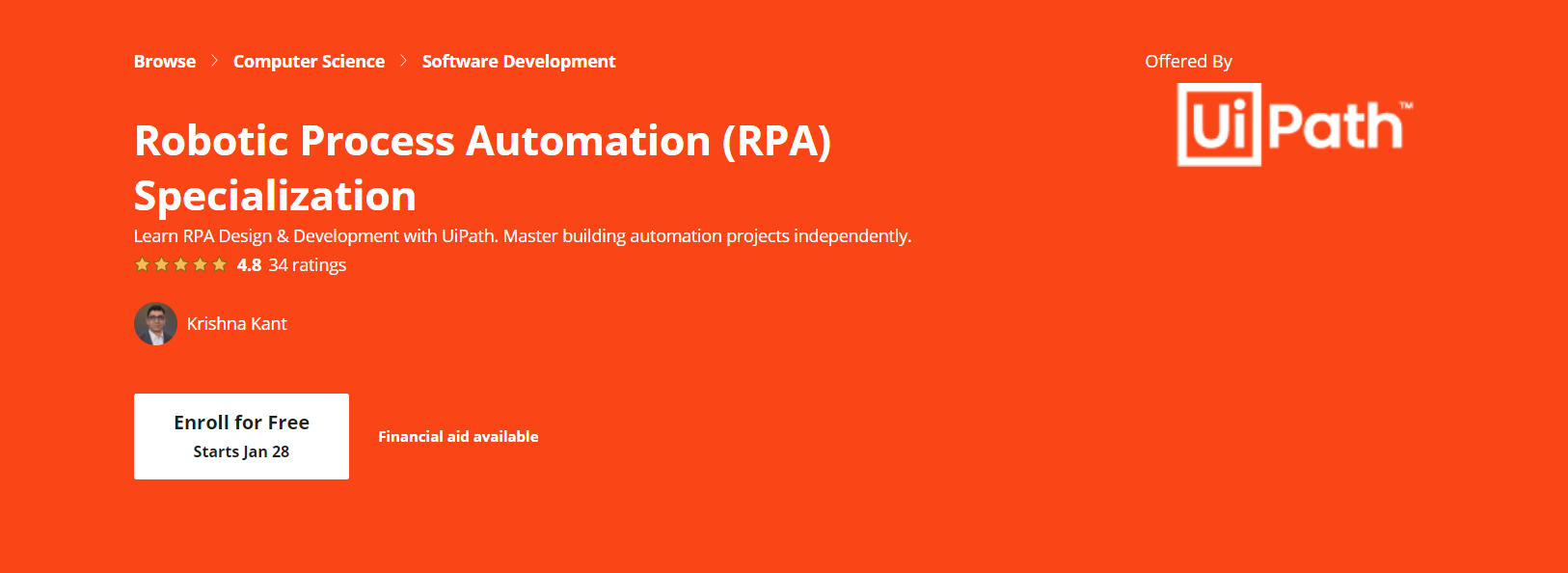UiPath and Coursera Partnership - Automation Skills for the Future (Community Blog)
UiPath and Coursera Partnership - Automation Skills for the Future

Introduction
Part of our mission at UiPath is to democratize automation adoption and education. To this end, we are excited to kick off our official partnership with Coursera, which was announced on January 24, the UNESCO International Day of Education. This partnership will allow Coursera’s 92 million users to prepare for the future of work by gaining automation skills.
Coursera learners can now access a short introductory course on automation – Step into RPA – and a full robotic process automation (RPA) specialization leading to the UiPath RPA Associate Certification.
Automation enables humans to do more complex and rewarding work, either by freeing their time spent on repetitive tasks or by providing new job opportunities. Multiple reports show that automation could increase human employment: 58 million jobs will be created due to automation by 2025, according to World Economic Forum.
Learn the basics
Understanding the basics of software automation and its impact on the way we work is crucial to any office worker, regardless of their background, seniority, or line of business.
The Step into RPA course on Coursera is a fantastic opportunity to this end. The course assumes no prior knowledge of RPA, and it takes a use-case approach. It begins by defining a real-world, generic problem and how it was solved in pre-automation. Then, the course teaches skills that enable learners to create a robot using free UiPath software to automate the solution. The use case is very generic, and the skills acquired can be applied to any scenario where the user must scan different webpages for information and save the results periodically.
The learners can choose between UiPath Studio and StudioX when going through the practical part of the course. Studio is our low code automation platform, meant for students who have a basic programming background and StudioX is our no code platform, suitable for anybody regardless of their background.
The last section of the course introduces the students to additional resources to continue their RPA learning journey.
Build expertise for a better career
The Robotic Process automation (RPA) Specialization takes learners further into automating processes of various complexity, preparing them for one of the most sought-after automation roles today: RPA (Automation) Developer. This technical role builds and deploys impactful automation projects across industries and business units.

Using the UiPath platform, the barrier to entry into such a role from a non-technical background is much lower than with other software development fields. This gives new career opportunities to students and professionals from various backgrounds. Only 53% of respondent RPA developers stated they came from software development in a recent survey. In the same survey, 97% of RPA developers reported being satisfied or very satisfied with their job, and 92% see high potential for growth for the RPA industry. Among the reasons for high job satisfaction, RPA developers named flexible schedules, impact, trust from leadership, and the opportunity to learn and use new technology. (State of the RPA Developer 2021, UiPath)
The robotic process automation (RPA) specialization offers comprehensive knowledge and professional-level skills focused on developing and deploying software robots. The specialization assumes no prior knowledge of RPA. Instead, it refreshes basic programming skills, introduces fundamental RPA concepts and teaches students how to use the UiPath Platform to automate business processes.
The specialization spans over six courses and 13 weeks with a time commitment of four hours per week. Each course takes two weeks to complete, and the last course, which includes the capstone project, can be completed in three weeks. The course content is a rich mix of videos, reading materials, practice exercises, and graded quizzes. Students are expected to complete the practice exercises to understand and master the concepts taught in each course. Each exercise is accompanied by instructions that incrementally reveal the solution that help students in challenging themselves based on their level of understanding of the concepts.
The first course of the specialization is “RPA Basics and Introduction to UiPath”. This is also the most popular course of the specialization. This course teaches the basic RPA concepts and introduces learners to the UiPath platform and its core components. Students can build their first automation project by the end of the course.
Having completed the first course, students venture on to more challenging topics in the next courses. Courses 2 through 5 deep dive into advanced RPA topics like data manipulation, Selectors, Control Flow, screen scraping, PDF extraction, etc. These four courses comprehensively cover all the RPA concepts and equip students with advanced skills to work on complex automation projects.
UiPath Orchestrator and Capstone Projects is the last course of the specialization. This course provides knowledge about Orchestrator and its capabilities. The specialization culminates in in Capstone Projects, in which the students can choose between two projects. Each project offers students a real-world scenario of what an RPA developer would face in the industry. The Capstone Project will help students integrate and apply the knowledge gained from completing the RPA Specialization. While working on the projects, learners will use critical thinking to solve challenging automation problems and develop skills to build robust automation.
Upon completing the specialization, learners can earn a Coursera Certificate. This RPA Specialization also prepares learners to achieve the UiPath RPA Associate Certification, a highly valuable, industry-leading credential.
Happy learning!
Program Lead, Learning Alliances, UiPath
Get articles from automation experts in your inbox
SubscribeGet articles from automation experts in your inbox
Sign up today and we'll email you the newest articles every week.
Thank you for subscribing!
Thank you for subscribing! Each week, we'll send the best automation blog posts straight to your inbox.



